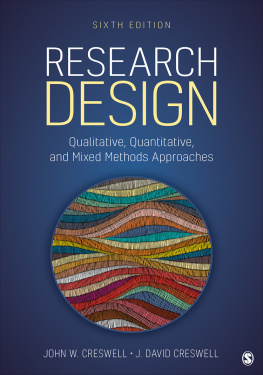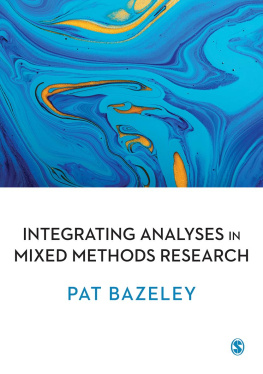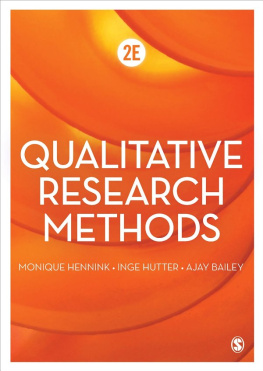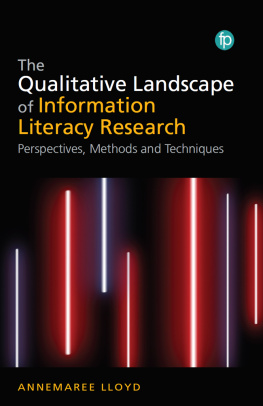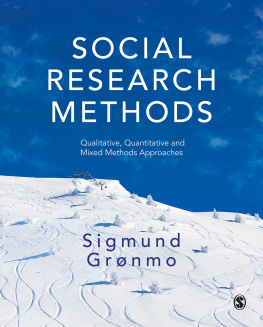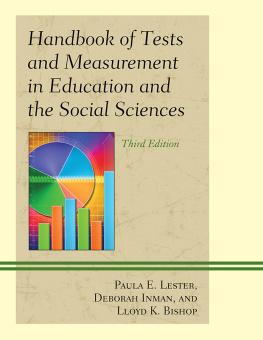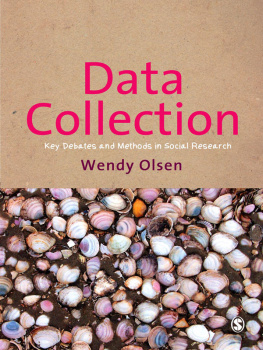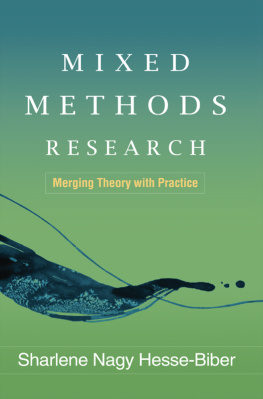Mixing Methods in Social Research
Mixing Methods in Social Research
Qualitative, Quantitative and Combined Methods

- Los Angeles
- London
- New Delhi
- Singapore
- Washington DC
- Melbourne
SAGE Publications Ltd
1 Olivers Yard
55 City Road
London EC1Y 1SP
SAGE Publications Inc.
2455 Teller Road
Thousand Oaks, California 91320
SAGE Publications India Pvt Ltd
B 1/I 1 Mohan Cooperative Industrial Area
Mathura Road
New Delhi 110 044
SAGE Publications Asia-Pacific Pte Ltd
3 Church Street
#10-04 Samsung Hub
Singapore 049483
Ralph Hall 2020
First published 2020
Apart from any fair dealing for the purposes of research or private study, or criticism or review, as permitted under the Copyright, Designs and Patents Act, 1988, this publication may be reproduced, stored or transmitted in any form, or by any means, only with the prior permission in writing of the publishers, or in the case of reprographic reproduction, in accordance with the terms of licences issued by the Copyright Licensing Agency. Enquiries concerning reproduction outside those terms should be sent to the publishers.
Library of Congress Control Number: 2019945239
British Library Cataloguing in Publication data
A catalogue record for this book is available from the British Library
ISBN 978-1-4462-8201-4
ISBN 978-1-4462-8202-1 (pbk)
Editor: Alysha Owen
Editorial assistant: Lauren Jacobs
Production editor: Victoria Nicholas
Copyeditor: Sharon Cawood
Proofreader: Jill Birch
Indexer: David Rudeforth
Marketing manager: Susheel Gokarakonda
Cover design: Shaun Mercier
Typeset by: C&M Digitals (P) Ltd, Chennai, India
Printed in the UK
At SAGE we take sustainability seriously. Most of our products are printed in the UK using responsibly sourced papers and boards. When we print overseas we ensure sustainable papers are used as measured by the PREPS grading system. We undertake an annual audit to monitor our sustainability.
About the Author
Ralph Hall MA PhD AMis an Emeritus Professor in the School of Social Sciences at the University of New South Wales, Sydney, Australia. He has taught research methods to both undergraduate and graduate students in the social science and policy programme in the School since 1990. His research interests include the role of peer mentoring in facilitating incoming students adjustment to academic study, the workstudy experience of students in addition to research designs in social research with particular reference to mixed methods. He has co-edited one book with Lynn Scott, namely
Global Issues: Perspectives on General Studies (Macmillan, 1987) and authored two, namely
Impacts: Contemporary Issues and Global Problems with Roger Bell (Macmillan, 1996) and
Applied Social Research: Planning, Designing and Conducting Real World Research (Palgrave Macmillan, 2008). In 2019, he was awarded an AM (Member of the Order of Australia) for services to education as an academic and to the community.
Preface
The use of mixed methods in social research is now well established. Texts on mixed methods began appearing in the late 1990s and particularly in the first decade of the 21st century.
This was a period in which mixed-methods research needed justification and many of these books launched into a defence of mixed methods as an alternative to straight quantitative or qualitative research. That time has now passed and mixed methods are now accepted as legitimate research designs. The need for a defence is no longer necessary.
The aim of this book is to integrate mixed methods into the mainstream of research methods texts. Mixed methods will be presented along with single methods and the circumstances in which each method could be considered appropriate outlined. It is now time that mixed methods is not seen as an additional course to standard research methods but is included throughout all research methods courses. It is intended that this book will contribute to the integration of mixed methods in all research methods courses.
The approach adopted here assumes that the reader has some basic knowledge of research methods and data analysis so that introductory accounts of these are not included. The focus here is on how these methods are integrated into mixed-methods research.
deals with the nature of social research and why mixed methods has emerged as an approach to doing research. This part also deals with the arguments that have been advanced for using mixed methods and the debates over methodology that gave rise to mixed methods.
deals with the research planning process and sets out the major research methods used in the social sciences and how these can be combined in mixed-methods designs.
sets out the methods available for collecting social science data and how these can be combined in mixed-methods research.
deals with ensuring quality in research, reporting findings and strategies for convincing stakeholders of the value of mixed-methods research.
This book is based on the experience gained from some 25 years of teaching research methods to advanced undergraduate students in a social science programme and to graduate students in a policy studies degree at the University of New South Wales. Many of the graduate students were already employed in research roles and appreciated the applied focus of the courses I taught. Their feedback, as well as that from my undergraduate students, has been helpful in framing my views about teaching research methods, for which I am grateful.
Part 1 Principles of Mixed-Methods Research
of this book examines the nature and purpose of social research and outlines the emergence of mixed methods as a major development expanding the scope and power of social research methods.
outlines the types and goals of social research methods, distinguishes between methodologies and methods, introduces the notion of paradigms and traces the emergence of mixed methods. The aim of this chapter is to acquaint readers with the developments in social research that led to the emergence of mixed methods.
develops the notion of paradigms further and their application to mixed-methods research. The relevance of paradigms to research is outlined with particular reference to mixed methods.
The Nature of Social Research and the Emergence of Mixed Methods
Introduction
In this chapter, the nature and origins of social research are described and the various forms it takes discussed. It is important for intending users of social research to understand the context in which the methods of social research have been developed and applied so that they are aware of their uses and limitations.


